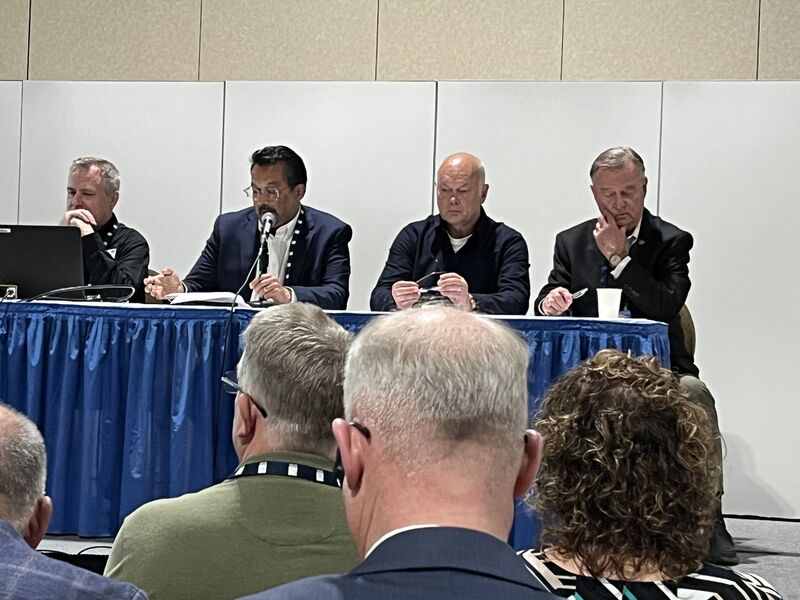Kim Lovegrove, Chair of the IBQC, Answers to Questions posed in an international Q&A session at the ICC International Conference held in Long Beach, California on the 21/10/2024.

The Q&A Session was held at the Annual ICC Conference, International Session, in Long Beach on Monday, October 21, 2024: Enhancing Global Building Safety. These were some of the answers to the questions posed by the moderator Mr Neville Pereira, Technical and Administrative Executive for Community Development, Public Works and Facilities City and County San Fransisco.
• Can you please give me a brief overview of your organization and its mission with respect to building safety?
• The IBQC’s vision is to enhance global building safety by developing best practice guidelines for building control systems.
• It fosters international collaboration, improves safety standards, and ensures robust regulatory frameworks that adapt to emerging challenges in the built environment.
• The IBQC has produced six globally impactful sets of guidelines that can be utilized by policymakers worldwide to improve building regulatory ecology. 1
• Its key strength lies in the remarkable array of skills and diversity within its board and institutional supporters. The international luminaries that make up the board and drafting coalitions include senior jurists, economists, academics, and law reformers from all corners of the globe2.
• The IBQC supports capacity building for regulatory authorities worldwide by developing good practice guidelines.
• Both of your organizations have a global focus – can you please identify the areas – either geographical or specific aspects of building safety (like codes and standards, regulation, building typologies, etc.) – where your organization’s true passion lies?
• The IBQC is committed to best practices and a holistic approach to building regulatory3 systems, addressing both emerging and developed economies.
• It has developed guidelines tailored to address and fashion holistic building regulation, product safety systems4, risk-based building codes and inspections5, liability apportionment, and more cost-effective dispute resolution processes.6
• Some of our guidelines provide a contextualized approach to regulating emerging economy settings, particularly in the ‘trinary’ of informal settlements, vernacular, and engineered construction.
• The organization prioritizes risk-based control systems, inspection protocols, and capacity-building to improve safety standards universally.
• The IBQC is guided by a diverse board with exceptional skill sets, contributing to its mission of enhancing global building safety across varied contexts.
• What do you think is the biggest challenge to achieving safer buildings on a global scale?
• The greatest challenge in achieving safer buildings worldwide is establishing universally adaptable building control systems that accommodate diverse economic contexts.
• Insufficient regard for international best practices in building regulation often leads to gaps in safety standards, regulation, and training.
• In emerging economies, there is a critical need for localized, bespoke building regulations that effectively address informal and non-standardized construction practices.
• Failure to adopt best practices in building regulation has resulted in documented fire disasters and structural collapses in both emerging and developed economies.
• The IBQC is motivated by increasing the benchmark of safety in built environments for the global citizen.
• What do you see as the biggest threat to the global built environment in the coming decade?
• The most significant threat to the global built environment in the next decade is climate change, which increases the frequency of natural disasters and environmental hazards. This necessitates resilient building practices to mitigate risks.
• Rapid urbanization, especially in emerging economies, often outpaces the development of robust regulations and enforcement.
• The mobility of migrant populations and capacity constraints in providing safe housing, viable infrastructure, and public safety add to the challenges.
• Additionally, converting large informal settlements into safer, regulated environments is a significant hurdle, particularly where adherence to international best practices is limited.
• Can you share a big, radical idea that – if implemented – would have the potential to make meaningful change in one or more areas of building safety?
• International bodies could generate adaptable model building acts and model building codes to suit both emerging and advanced economies, with particular regard to best practice regulatory ecologies.
• These models need to be practical, workable within local contexts, and suitable for adoption, adaptation, and contextualization.
• For emerging economies, aspirational elements are crucial to facilitate progress towards international best practices.
• Integrating long-term improvement and safety standards within existing frameworks is key.
• In this speakers submission model acts and best practice regulatory ecologies should have regard to the 9 key elements that comprise the “Building Control Holistics” framework, including:

Footnotes
- See IBQC Guidelines here ↩︎
- Leadership Page IBQC ↩︎
- https://www.ibqc.org.au/ibqc_guidelines/ibqc-principles-for-good-practice-building-regulation/ ↩︎
- https://www.ibqc.org.au/ibqc_guidelines/building-product-performance-part-2-good-practice-regulatory-framework/ ↩︎
- https://www.ibqc.org.au/ibqc_guidelines/risk-based-building-classification-and-inspection-guidelines/ ↩︎
- https://www.ibqc.org.au/ibqc_guidelines/ibqc-good-practice-guidelines-for-the-development-of-construction-dispute-resolution-tribunals-and-decision-making-institutions/ ↩︎
Although I am the Chair of the IBQC these are my own views as the questions were posed for me to answer.
Disclaimer
This article is not legal advice and discusses its topic in only general terms. For legal advice consult with an experienced construction lawyer in your local jurisdiction.
